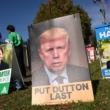Hothouse Magazine was set up to communicate for community.
To be a safe space for dangerous ideas that hold power to account.
And in a world where harmful actors have deep pockets to spread misinformation and buy political favour, it’s all the more important to remind voters where a politician’s loyalties lie.
When the 2025 Federal Election rolled around it was the perfect opportunity to fire up the engine and have a crack at making an impact. So that’s what we did.
At the start of the year, a Peter Dutton victory loomed large, and in no time the Coalition’s policies began to take Trumpian form. Climate regression, public service cuts, culture wars. One after another, Dutton took aim at the institutions and social safety nets that set Australia apart from America.
Our job at Hothouse was clear. To bring voters accurate information on who Peter Dutton’s Liberal Party was and what voters could expect with them back in power.
Why? Because politicians are meant to represent the interests of their constituents. Instead, both major parties often fight harder for policies which enrich big business at the expense of the rest of society.
Over the course of four months Hothouse elevated thousands of relevant news stories, facts and political commentary in a targeted advertising campaign, to set the record straight on issues which threatened people and planet.
And it didn’t take long before we caught the eye of the media.

Cam Wilson, Crikey Mar 20, 2025
‘The group is Hothouse Magazine, a self-described news organisation run by a “collection of politically active creatives, writers, artists and educators to create engaging and factual political advertising” writes Cam Wilson at Crikey.
‘The new entrant gained notoriety for linking Peter Dutton to Donald Trump, including corflutes depicting the opposition leader with Trump’s signature blonde combover.’ wrote the Guardian.

We even caught the attention of Liberal Senator James Paterson, who pontificated “Disguising political attack ads as news reporting is an affront to journalism and risks dangerously eroding public trust.” We totally agree.
Maybe that’s a message that Rupert Murdoch needs to hear – the most cashed up fossil fuel activist in the world running misinformation, fear and smear campaigns 24/7.
“The big difference is community “activist groups” don’t stand to make millions when we win” says Matt Bray. “We don’t fight for profit. We fight for clean air, affordable energy and a safer community for everyone.”
Arming the public with information they needed to cast an informed vote in the Federal election was our mission.
But we were far from alone in the third party advertising space.
Advance Australia, Australians for Prosperity, Coal Australia, Mums for Nuclear. These were just some of the shady groups across the political divide working furiously for a different outcome.
“They’re old dogs playing old tricks” Says Matt Bray. “Sure, money can buy people’s attention, and if you slap them in the face enough with a message it’ll stick. But our content actually had some personality with a priority to inform rather than manipulate. A novel concept in this space that helped us punch above our weight.”

‘Given Hothouse’s relatively low-level brand recognition, Hughes said its ads linking Dutton to Trump would likely have planted the seed in some audiences. And it did that with less than a third of Advance’s budget.’ writes Jonathan Hair and Matt Martino at ABC News.
So how did we do? TBH, we think Hothouse Magazine was impressively influential during the election. We’re running the numbers on our maiden campaign and they’re looking very healthy. Impact report coming soon.
“It was a success unexpected but most welcome” says Matt Bray. “We certainly put in the effort. When we got on the radar of the Liberal Party who labelled us a “cashed-up activist group” we knew we’d done something right.”
So that’s project one done and dusted.
We turned the Hothouse heat on Peter Dutton’s Coalition and their raft of terrible ideas. And the result wasn’t too shabby. We’re proud to have been one progressive voice among many working to inform, rather than mislead, voters.
In the political realm we’ll be keenly following initiatives around voter literacy, like the next steps for Build a Ballot from Project Planet, orgs like whotargets.me exposing who is manipulating your media feeds and efforts to encourage truth in political advertising, like Zali Steggall’s voluntary Ethical Political Advertising Code (EPAC).





